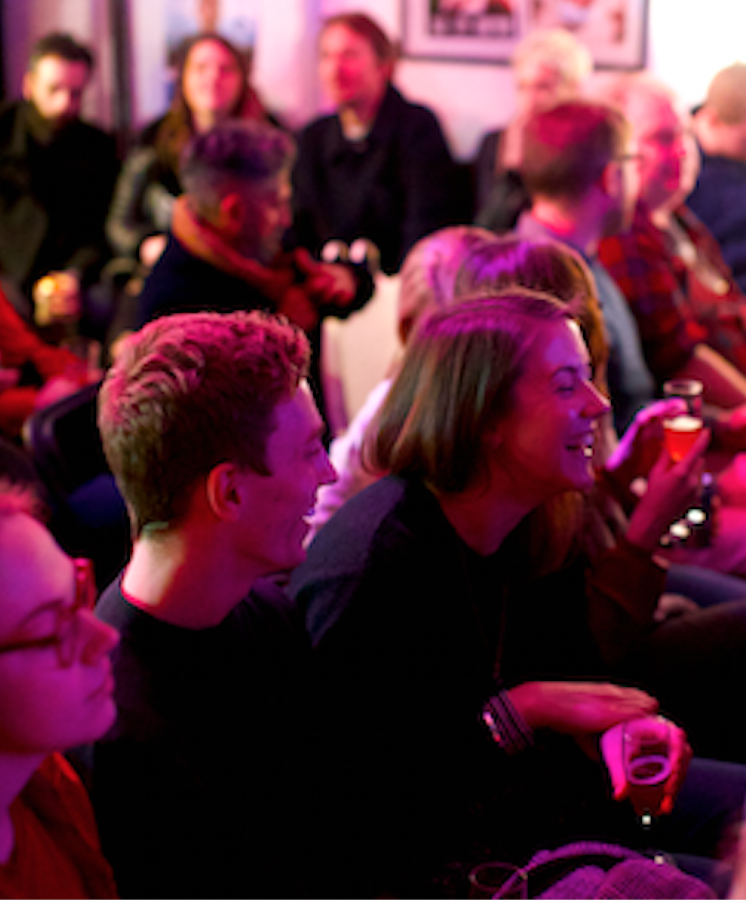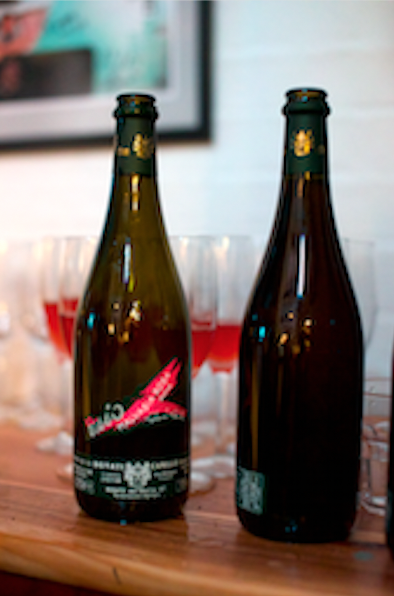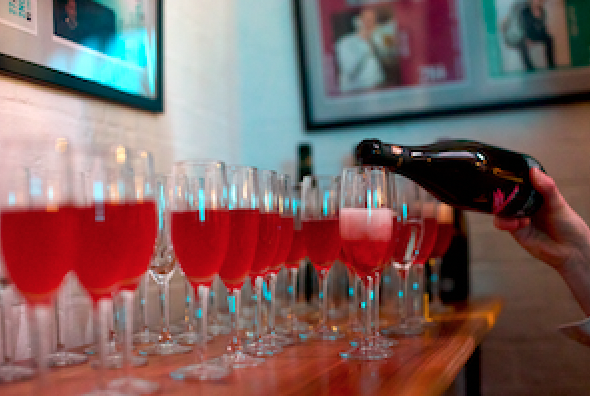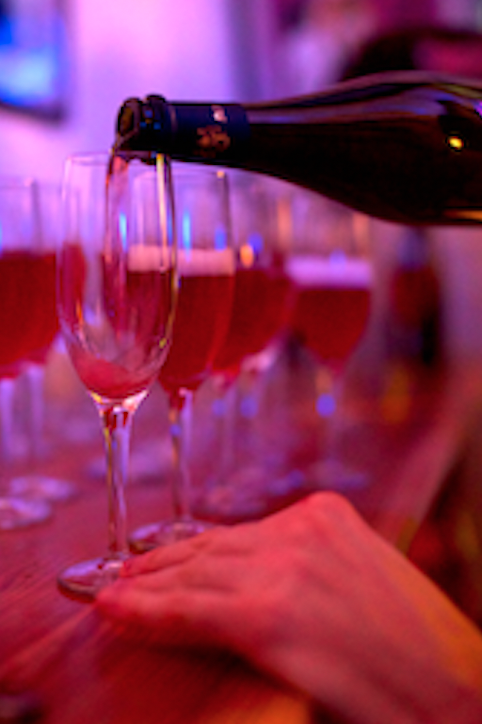- A friend said a wine he tried recently was bitter and not properly fermented. Sounds like sour grapes to me.
- A friend of mine cooks by making up a recipe and adding a German white wine. It’s an add hock approach to cooking.
- I used to have a dog who liked red wine. He was a Bordeaux collie.
- I went to a wine bar called ‘The Light Brigade’ recently. They certainly knew how to charge.
- Someone told me that their non-alcoholic wine was delicious. I said they had no proof whatsoever.
- I always decide which wine to drink on a case by case basis.
- My friend gets annoyed when I mess with his red wine. I added some fruit juice and now he’s sangria than ever.

Considering that it is meant to promote ease of mood and happy laughter, the cupboard of wine jokes offers surprisingly scanty rations. Corking puns aside. Usually, the jokes involve some form of dipsomania or revolve around wives locking husbands in wine cellars. When handled well, the subject of wine can be amusing. The movie Sideways was funny because it showed how wine can become an obsession for some, and people who are thoroughly obsessed can only communicate with others through their obsession. And it was easy to poke fun at pretention (the famous Thurber cartoon) and social insecurity/one-upmanship (Abigail’s Party). Wine and snobbery used to go together like port and stilton, from the contemptuous preening sommelier of yesteryear to the overly-mannered taster who ostentatiously sipped and slurped and ventilated his (always his) opinions with the authority of an oracle.
How do wine tastings and stand-up comedy go together? Like port and stilton? No, infinitely less crusty than that. More like natural Georgian Mtsvane and a sixteen-dish banquet. Naturally Funny was the brainchild of Emily James and Jo Wiggins, the idea being to combine their love of natural wine with comedy. The reasoning behind this was spot-on. Natural wine (as one elderly wine educator lamented) attracts a younger audience, one less in thrall to received wine wisdom. It is viewed as partly counter-cultural, against #thebrand. It pairs equally well with artisanal food and Instagram accounts. The audience at naturally funny were mostly in their late 20s and early 30s, prime potential natty wine novitiates.

A good comedy routine may seem artless and self-generated, but is the result of rigorous preparation and hard work. That’s how you get to Carnegie Hall, isn’t it? It will be tightly-structured, all the while making room for digression and tangential foray, and also bringing the audience into play. Comedy is second nature to professionals; they are as actors who can flick an internal switch when they go on stage and instantly project a fully-realised persona.
How do wine tastings and stand-up comedy go together? Like port and stilton? No, infinitely less crusty than that. More like natural Georgian Mtsvane and a sixteen-dish banquet.
Wine tastings obviously also have an audience. It would be strange if they didn’t. Solo bombinating in a spittoon doth not a tasting make. Even if it were to be the same audience, it would be different audience for various reasons. Whereas comics engage by describing their life experiences (real or imagined) or creating rich comic scenarios or strange alter egos, a wine presenter (is that a thing?) is tied to a specific wine and to a specific subject that not necessarily everyone is invested in. One envies that staged cooking demonstrations with chefs bishing, bashing and boshing, rattling pans, pyrotechnics and prestidigitation – going the full quasi-operatic. Wine tastings, ironically, are generally more sober affairs, less arm-waving and emoting and no salt and pepper.
Our wine presenter must have a lightness of touch without seeming to trivialise the subject. People do expect to be informed, but they don’t want to be bludgeoned with facts. They don’t want to know about whether the wine is fermented at 12 c in a 10,0000-litre stainless steel tank or the niceties of argilo-calcaire soils. You can’t take anything for granted – many people will only have the vaguest idea of what “fermented” means, for example. Defining the terms to demystify the subject is crucial, but time constraints being what they are, you end up breathlessly trying to decant a jeroboam of information into a thimble-sized glass. To be fair, I imagine that people prefer the wine they are holding in their glass to be animated, romanticised, given an earthy or poetical back story, and also be shown what to look for when they are actually tasting. Whenever I have been in the audience at a tutored tasting (even the language suggests a staid approach to sharing information about wine), Chardonnays were invariably presented as tasting of peaches and cream, Sauvignons of gooseberries and elderflower; and that wines could be instantly decoded if you knew which plumptious fruit-analogue to select. When you are tasting natural wines, you are in uncharted waters. The tasting rules of engagement should not apply. In a wine tasting or a comedy routine, the digression (deliberate or spontaneous) relies on setting a scene. It is organic, taking shape as it is told. I suppose it is like freeform jazz compared to the tight riffs that some comics trade in.
Natural Wine pairs equally well with artisanal food and Instagram accounts.
There are some differences. Although comedy doesn’t have to be a succession of one-liners or a constant barrage of brilliantly funny observations, any routine has a built-in promise of future laughs and some sort of pay-off or punchline. A typical wine tasting doesn’t have that same structural expectation; it is based around deconstructing a wine, showing all its component parts so that you understand “how it works”.
And I didn’t want a highly filtered tasting in the midst of a natural comedy ferment.

Over the years I have tried to inject some emotion into the subject, and demonstrate that this substance in the glass is more than any old product, that it comes from a place and a person.
Once, way back when, I actually received a spontaneous ovation in the middle of tasting. I had gone off on a tangent, talking about biodynamics and morality and got myself into a spittle-flecked yet high-flown state. It was a bit like one of those comedy rants, taking the form of a spontaneous outpouring of passion, what I call “riding hobbyhorses in all directions at once and just keeping hold of the reins.” Wine tastings also have moments of silence, or practically speaking, time for the audience to taste, enjoy (or otherwise) the wine and to talk amongst themselves. During some tastings it is very difficult to gain the audience attention back – the spoon tapped on the wine glass is the summoning bell, but ambient chatter makes it tricky. The comic deploys an arsenal of tried-and-tested rhetorical techniques; the confidential tone, the conversation with one person in the audience, the rhetorical question, the exaggerated pause; the use of facial expressions, physical appearance or props. Ben Pope did a great line in agreeably dishevelled smiliness; Sophie Duker was bouncy and physical, kind of hip-hop comedy, and Suzi Ruffell was all clever angles and pithiness. The final routine was more unstructured, and made me imagine what it must be like to go on stage without knowing where you are going. As an experienced stand-up you presumably have a fall-back, but sometimes you must lose the train of thought and have to improvise. This would be my preferred approach. On the one hand it seems unprofessional not to prepare, but I have always given my best tastings when I am talking off the top of my head (and possibly out of my hat).
My first ever wine tasting to a largeish audience (around 60) was in a restaurant in Chiswick. I wanted to prepare for every hypothetical scenario, so I made copious notes about the minutiae each wine, printed out sheets so that I could glance down and read verbatim if necessary. This tasting was also notable for the fact that Gregg Wallace was the “act” before me. From memory, he told three mother-in-law jokes in rapid succession and departed with applause ringing in his ears. I then had to make six interventions during the course of the dinner, all of which I delivered in a monotone, detailing the most trivial and mind-numbing facts. To quote Dylan Thomas: “Someone is boring me. I think it’s me.” At one point, I started talking about a particular wine and I could actually hear my voice embarking on some litany of trivia, and suddenly I forgot where I was in the sentence and what I wanted to say. Was there a verb meant to be driving this nonsense? Which wine was I talking about? I glanced at the handwritten prompt-words on the page which blurred into hieroglyphs… Engulfed in a mental blank, I paused for five, six seconds – an eternity it seemed – and long enough to go various shades of beetroot.
I love the people,
But do not like to stage me to their eyes:
Through it do well, I do not relish well
Their loud applause and Aves vehement;
Nor do I think the man of safe discretion
That does affect it
–Duke Vincentio, Measure for Measure
So, what do you do if you are not a natural speaker and you are preternaturally shy? Take up comedy? You can either hide under a rock all your life or you expose yourself to more public scrutiny. And try to improve each time. I wonder if comics are ever 100% happy with their shift, or whether there are times that they feel they have absolutely nailed it. I tend to think that they are their own severest critics.
I’m rarely satisfied with my wine tastings. Invariably, I experience classic l’esprit de l’escalier, recalling just after the event that killer quotation, or deliciously pointed apercu, that would have left audience rocking and reeling with admiration/laughter. In one’s fondest imagination. Out of a couple of hundred tastings that I have hosted over the years, there have been three or four times when I have actually felt elated immediately afterward and felt I outperformed my expectations. One of these was more to do with circumstance rather than inherent brilliance on my part. I had been invited to South Africa to give a talk at natural wine event, one attended by a mix of growers, private customers and journalists. I had flown in that very day from London, and not having slept on the flight, was feeling pretty spaced-out by the time of the tasting. Finally, my time came. I was given a rough brief to chat for a quarter of an hour or so about natural wine. As my fancy took me. And my fancy was the only thing holding me up. It was an odd set up because I was in the centre of a huge split-level room, so I had to swivel often to make eye contact with (and project to) people standing behind me. Anyway, I talked and talked without a plan, as if stepping out on an unknown country road in the dark. My mind began to wander and suddenly I had a profound outer-body experience, the curious sensation of looking down at myself talking to a roomful of people. Talking, but the words were mere ambient sound, sentences merging as small streams feed into wider rivers. I must have talked without a breath, or an engaged brain cell, for forty minutes in total, and when I became returned to planet earth again I was suddenly aware that either everyone was completely spellbound, or, more likely, they were quietly aghast because they thought I was having a stroke, or was a surrealist clown who had wandered in off the street and talking any old nonsense.

Of course, silence does not automatically denote an audience hanging on every word. Especially, when it is a captive audience. They could have been stone-cold bored. But I was on an exhilarating high at least, the high of psychedelic jet lag when you float around grinning inanely at nothing in particular. But it felt great – and I loved this altered state, becoming a person I didn’t recognise. Comics have to command a larger room with a bigger audience; laughter is the ice-breaker for the audience and the encouragement for the comedian. Like someone saying you’re doing your job well. We love to laugh; it’s cathartic and brings a group of people together. You obviously don’t come to a wine tasting to laugh – any laughs you do get are gravy. Of course, people come primarily for the wines and to learn about what they might like to drink – or purchase – in the future. There is a transactional element when you are showing a product. Wine has to be about the story behind the label and to make that liquid come alive is the art of a good wine taster. I also see wine connected with so much else: wine is the result of so many things: it is the country, the region, the climate, the microclimate, the geology, the history, the culture, the farming, the winemaking, the personality of those involved. When you talk about wine you may touch on gastronomy, micro-biology and philosophy. Yes, we are a long way from “all Sauvignon tastes like cat’s pee.”
The point is to engage the audience with what is in the glass and avoid the disconnect that exists when people feel that wine is a quasi-academic subject that they are not entitled to have an opinion on.
To avoid some of the procedurals alluded to above, I only do tastings featuring artisan natural wines. I guess I want to paint pictures of places and real people – easier to do that when you are talking about farmers who make their own wine from tiny vineyards – and try to surreptitiously slide in some nuggets of factual information as I go. The point is to engage the audience with what is in the glass and avoid the disconnect that exists when people feel that wine is a quasi-academic subject that they are not entitled to have an opinion on. I would be far happier having a discussion with an audience, answering questions, eliciting responses about the wines and interrogating – in the nicest possible way – how people taste. Comics have this brilliant ability to make the audience part of a story they are telling. That interactive energy feeds into the routine. One disconcerting aspect of wine tasting is that if you are showing and talking about a wine and almost everyone dislikes it, the audience transfers its disappointment onto you as if you are wilfully conning them. One dodgy bottle can undo the most cunningly-wrought evocative story.
If you tell a joke in the forest, but nobody laughs, was it a joke?
–Steven Wright
Does this happen to a comedian if a joke falls flat? I don’t know. I suppose you might sacrifice a little temporary good will, but you can redeem it with something. Self-deprecation. Another joke. The single joke is not the thing; it is the picaresque journey that matters. The brilliance of the stand-up comic is to make the routine look easy, to command the stage and have the audience in her/his respective back pocket. Watching the various comics at Naturally Funny, I feel that some of that bazing that they projected, would liven up one’s common-or-garden wine tasting. Maybe not a succession of mother-in-law jokes, but anecdotes delivered with panache and ideas bounced merrily around, so that your audience laughs and thinks, while it drinks.

